#deconstructivist
Text

Heinz-Galinski-Schule (1995) in Berlin, Germany, by Zvi Hecker
393 notes
·
View notes
Photo







Gehry House, Santa Monica, USA - Frank Gehry
-
#Frank Gehry#architecture#building#design#modern architecture#contemporary#deconstructivist#post-modernism#quirky#abstract#angles#house#house design#interiors#living room#light#timber#glass#kitchen#usa
249 notes
·
View notes
Photo

Canadian-born American architect Frank Gehry designed the deconstructivist Biomuseo (2014) at Panama City, Panama. The museum's eight galleries showcase biodiversity, geology, biology, and oceanography.
8 notes
·
View notes
Text

Rem Koolhaas and Joshua Prince-Ramus - Seattle Public Library (2004)
#architecture#deconstructivism#deconstructivist#architects#design#art#art history#200s#2004#21st century#seattle
4 notes
·
View notes
Photo

Wexner Center for the Arts was designed by Peter Eisenman. Photo courtesy of Eisenman Architects
#architecture#Peter Eisenman#wexner center for the arts#Eisenman Architects#dezeen#afotw#deconstructivist#deconstructivism
11 notes
·
View notes
Text

Daniel Libeskind
The Michael Lee-Chin Crystal at the Royal Ontario Museum, 2007
Photo: Source
#daniel libeskind#studio libeskind#architecture#deconstructivist architecture#deconstructivism#royal ontario museum#contemporary architecture#postmodern architecture#architectural design#dezeen#archdaily
33 notes
·
View notes
Text
it's really funny reading tumblr posts by humanities people coping about how STEM fields aren't more intellectually challenging
first of all, 9/10 the op's most extensive understanding of statistics is likely to be the insufferable spider georg meme, and second of all...
the burden of proof needed to demonstrate your grasp of a subject is much harder to attain in quantitative fields than it is in humanities. for a solid portion of the humanities this is even something you can memorize and/or bullshit (within limitations; law for example is quite rigorous and logical).
this isn't to say humanities have no value or that you can't bring rigorous methodology to it. they do, and you can. but broadly speaking, STEM-level rigor is not necessary, or enforced by institutions that teach it. a sufficiently motivated person can still do it, obviously. but an average person in an average environment will not.
guarantee you the typical rocket scientist could, if they had the time to dedicate to it (perhaps as a passion hobby), come up with an insightful literary analysis of some work or other. the literature phd 99% cannot do anything remotely connected to the rocket scientist's work.
#yes science in general does contain absolute bunk#usually though. even generating bunk science is beyond a gender deconstructivist ba's ability. sorry. stop coping so hard.
9 notes
·
View notes
Photo
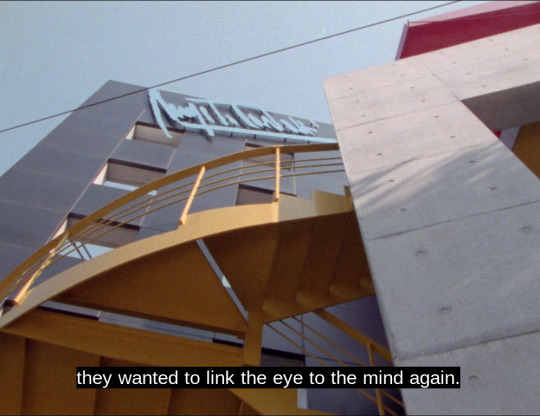

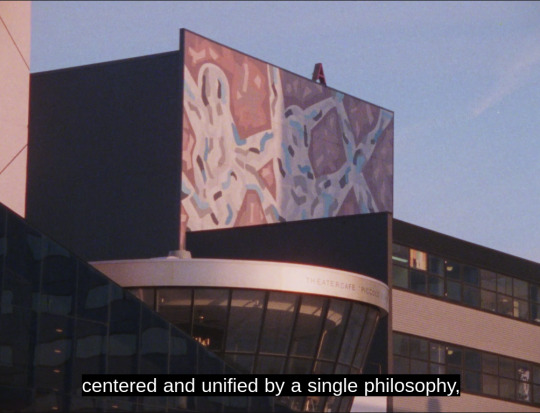

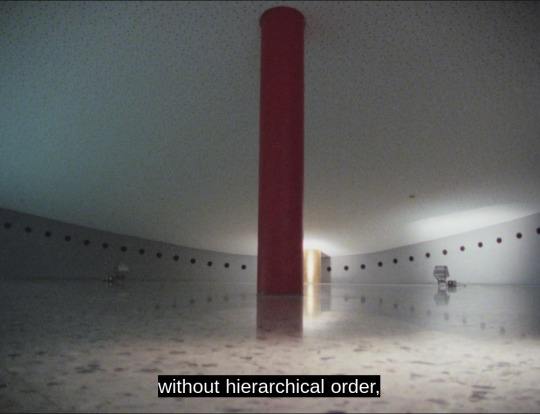
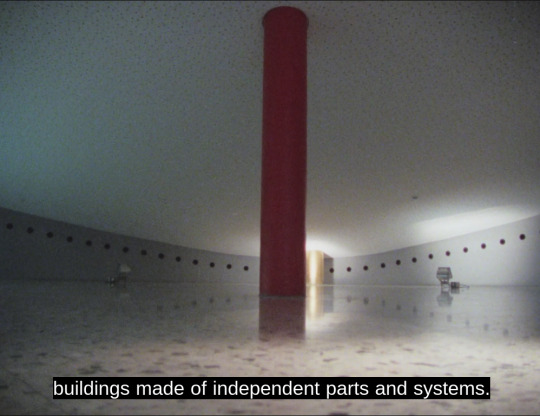




Deconstructivist Architects (1990)
#deconstructivist architects#michael blackwood#documentary#jaques derrida#peter eisenman#frank gehry#zaha hadid#coop himmelblau#jeffrey kipnis#heinrich klotz#talks
24 notes
·
View notes
Text
i hope that post is comprehensible to anybody besides me. i avoided semiotics almost entirely to try and keep it ground level. but i could go off about deconstructivism too. i won't but i could.
#peter posts#i'd actually have to read deconstructivists texts to do that & that's just not happening this week
2 notes
·
View notes
Text
Sometimes you just have to get high and have a crisis you've been avoiding for like 6 years.
#watched rhett and link's deconstructivist update video#never heard that term before and went down a rabbit hole
1 note
·
View note
Text

Housing Estate (1987) in Darmstadt, Germany, by Rüdiger Kramm
#1980s#housing#deconstructivism#deconstructivist#architecture#germany#architektur#darmstadt#rüdiger kramm
138 notes
·
View notes
Text
One of the major themes of ‘Ace Attorney’ has always been trust, obviously. Like, this is the most important creed that Mia Fey passed down to Phoenix and from there to anyone he has touched.
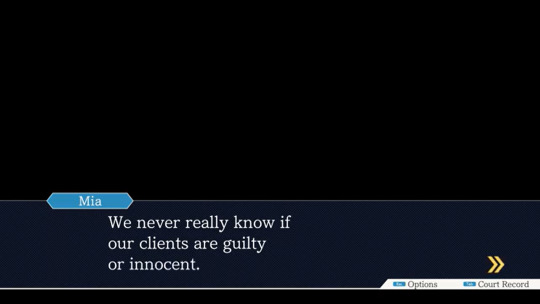

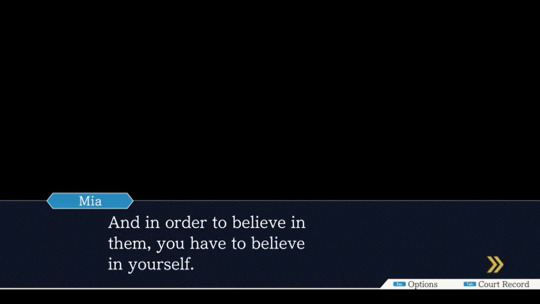
As well as just generally being one of Phoenix’s most important positive qualities.

The entire arc of the first game hinges on the idea of the Power of Trust, with it being a core pillar of Phoenix's relationships with both Miles and Maya.
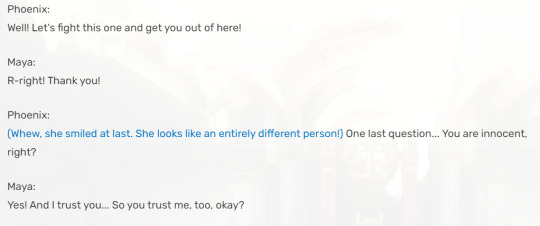

And even the main gameplay themes of ‘turnabout’ and ‘turning your thinking around’ are linked to this theme of Trust. The whole idea around the narrative of a ‘turnabout’ is that the Defendant seems obviously totally guilty, but the defense attorney proves them innocent by Trusting in their innocence.
And ‘turning your thinking around’ is generally framed as - rather than the general mystery-solver mindset of trying to deduce what has happened from the evidence given - trusting in your client’s innocence and looking for evidence that should be there if they are innocent/that other person is the culprit. Using the Trust in the client as the foundation to build your logic from.
And being such a core theme of the franchise, the games started reiterating on and deconstructing it almost immediately. “Farewell, My Turnabout'' having a Guilty Client feels like the most obvious example, maybe. But actually the game starts casting suspicions on Engarde pretty early on, and most of the emotional turmoil related to him is more of the, like “will Phoenix sacrifice the truth for Maya’s sake” hostage situation stuff.
I think the more important stuff in that case is more about the Phoenix-Edgeworth drama. How Phoenix’ sense of trust, which seems like such an unwavering and unbreakable virtue in the first game, does actually have limits. Phoenix feels that Miles has betrayed his trust by, y’know, running off to Europe and making him think he was dead - and it takes him time to learn how to regain this sense of trust in him.
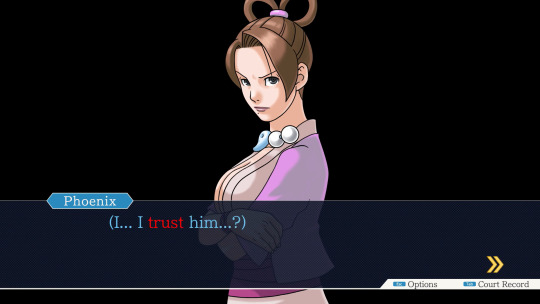
Meanwhile, Matt Engarde, he considers himself strong because he trusts in no one. In contrast to Adrian, who both he and she herself see as ‘weak’ because of her tendency to blindly trust the person she is dependent on. But at the end, it’s Matt’s distrust in everyone around him that brings on his own downfall.
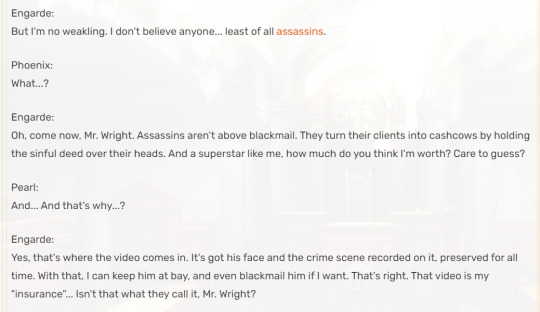
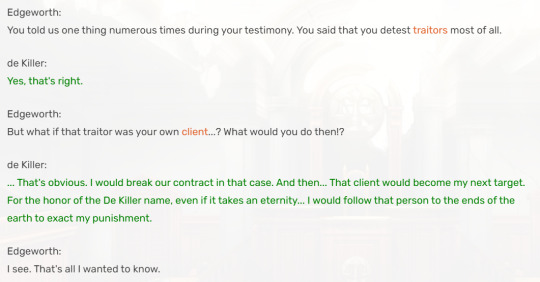
And the game after that adds in Dahlia Hawthorne who is, as Mia Fey’s nemesis, a sort of representation of the dangers of trust. A character who uses and manipulates those who put their trust in her.

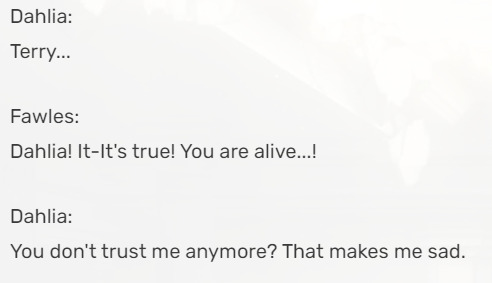

“Apollo Justice: Ace Attorney” establishes its more cynical and deconstructivist tone compared to the original trilogy in part by always putting some sort of element of distrust between the Lawyer and the Defendant. With Apollo basically unable to really have a decent conversation with any of his clients, many of them being antagonistic towards him or hiding things from him. Phoenix Wright was basically the only defendant Apollo went into court actually 100% putting his trust in him… and we all know how that worked out.
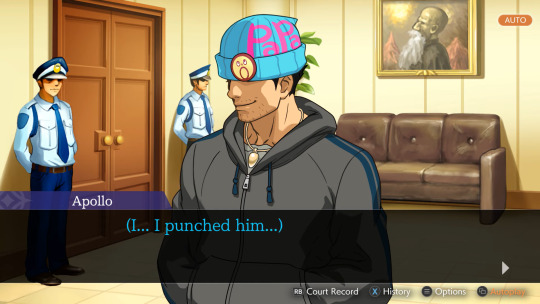
And this moment is especially effective because… if you’re playing this game unspoiled after finishing the Phoenix Wright Trilogy, you probably trust Phoenix as well! The emotions Apollo feels as he sees who Phoenix had become are meant to mirror the emotions the Player probably feels at this very moment. And the hints and questions about what Phoenix did in the trial seven years ago are a challenge to the trust of both Apollo and the Player. Both of them are stuck between what they knew of Phoenix before and the revelation of what Phoenix confessed to in “Turnabout Trump”. Apollo’s uncertainty is the player’s uncertainty as well.
And even if Apollo’s image of Phoenix is somewhat improved by “Turnabout Successions” and it’s clearly established that, no, Phoenix never knowingly used forged evidence as an attorney… There’s no big reconciliation that fixes everything like with Phoenix and Miles. It’s clear that Apollo’s sense of trust, in Phoenix Wright and in general, never quite recovered from the events of AJAA. Later games do still reiterate that he’s a lot more distrustful than other playable attorneys.
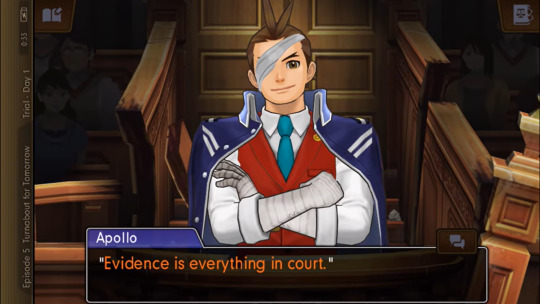
(And that’s also a point where the Player-Player Character Synergy from ‘Turnabout Trump’ kinda diverges, since I think most Players do regain their trust in Phoenix by the end of AA4 at least. Especially as unlike Apollo, we actually got to be inside his head again - that’s not exactly an experience Apollo will ever get to have. )
But, well, maybe it’s because it’s just really fresh in my mind, but I just think what ‘The Great Ace Attorney’ Duology does with this theme is just… really cool!
These games really play on the idea of challenging the trust… not just of the Player Character Ryunosuke, but also of the Player themselves. Because Ryunosuke also gets to have a Guilty Client… as his very-first actual client who is not himself. And since the game doesn’t lay on the suspicion quite as thick as with Matt Engarde, and since there’s no hostage situation of course… This plotline can have emotional synergy between the Player and the Player Character and focus a lot more about the emotional repercussion of putting your trust in someone totally absolutely unworthy of trust.
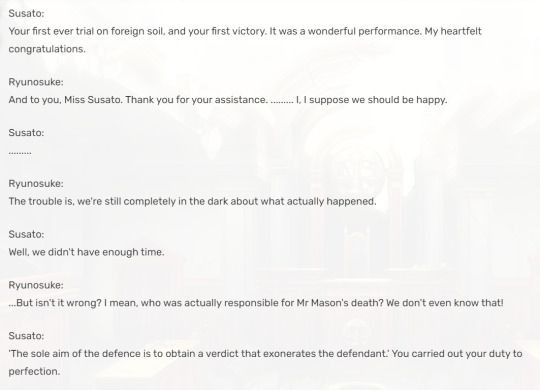
And how this betrayal of trust haunts the characters moving forwards. How Ryunosuke now finds himself being held back by his doubts due to the memories of this terrible trial, and... not necessarily a lack of trust in others as much as a lack of trust in himself. How Susato is driven to do something she considers unforgivable - tempering with the Crime Scene behind the police’s back - because that trial had made her lose trust in the entire British Justice System.

The entire climax of the first game is thus a reaffirmation of the power of trust. By unwaveringly defending Gina - a girl they have bonded with, but has also been extremely uncooperative, shady, dishonest and literally involved in what went down in the McGilded Trial, in a very grueling and seemingly unbeatable trial - Ryunosuke and Susato rediscover their ability to trust their defendant. Because, yeah, trust is a leap of faith - you never know when you’re gonna meet a McGilded or a Dahlia Hawthorne - but it’s also absolutely worth it.

And then with the themes of conspiracy strawn throughout the games and especially ramping up in the second game, that’s really kinda a thing that’s bound to sow seeds of paranoia and distrust in the Players about… all sorts of characters. Like, okay, I am fairly sure that pretty much every player who first walked into the Lord Chief Justice’s office and saw Mael Stronghart was like “Oh look! That’s the Final Boss!”. But with the hints for there being some sort of web of intrigue being hidden in the shadows, there’s plenty of other characters that skirt the line between feeling suspicious and trustworthy. The reveal that Seishiro Jigoku is actually a culprit was one of the best-done reveals in the whole franchise. And on the other hand, there are many reasons to be suspicious of Yujin due to the amount of secrets he clearly keeps, and yet he turns out to be a very straightforwardly heroic character.
And then there’s Kazuma. And Mael Stronghart might be the Obvious Final Boss to the Conspiracy and Murder Mystery parts of the game, but within this thematic throughline of the challenges of trust, Kazuma is pretty much that part’s Final Boss.
Initially designed to be someone both the characters and the players intently trust, both in terms of the meta-perspective of how he’s set up to be a kinda Mia-Miles hybrid and any Player with knowledge of the previous games will know that’s a kind of person you can rely on. And in general, even to newcomers, everything he says and does in the first two chapters of the game make him feel like just a very upstanding guy you can trust.
Then, when he comes back in the second games, he comes back with a new attitude that feels colder towards Ryunosuke (and thus the Player) and that’s also coupled with a whole bunch of mysteries about him that were hinted in the previous game, but are now coming to the forefront.
And as the Trial of Barok Van Zieks progresses, it becomes increasingly clear that Karuma has, theoretically, all the possible motivation to kill Greyson and frame Barok for it, that he was one of the last people to see Gregson before his death and that he literally brandished a sword at him. And despite how cagey and shady he acts, he still insists he never killed anyone.
And the reveal that he has knowingly participated in an assassination plot behind the backs of both Ryunosuke and Susato is bound to cause a feeling of shock, confusion and betrayal not just in these characters - but also in the Player. The Player and Player Characters are in a lot of emotional synergy through this entire Kazuma storyline. These feelings of conflict between wanting to trust Kazuma after seeing him in his best and all the mounting suspicions due to all the revelations about him are really felt by all three of us.
And in the end the challenge for Ryunosuke and Susato is not to abandon Kazuma completely, and it’s not to continue blindly trusting their old idealized view of Kazuma - it’s to face the fact that he has kinda lost his way for single-minded revenge, while also still trusting that he is deep-down the same good not-murdery man they have known him as before.
#ace attorney#the great ace attorney#great ace attorney#gyakuten saiban#dai gyakuten saiban#dai gyatuken saiban#tgaa#tgaac#tgaa2#ryuunosuke naruhodou#kazuma asogi#ryunosuke naruhodo#gaac#dgs#dgs2#dgs sherlock holmes#tgaa chronicles#tgaa 2#aa#pwaa#phoenix wright#phoenix wright ace attorney#aa meta#ace attorney meta#phoenix wright trilogy#aa trilogy#ace attorney trilogy#apollo justice ace attorney#food#phoenix wright: ace attorney
124 notes
·
View notes
Text
Can’t wait for the deconstructivist narrative about Mickey Mouse. Where he learns about everything he's considered to be a symbol for. But also learns about the joy and everything he brings.
Leave your ideas in the comments.
#mickey mouse#mickeyinthedomain#steamboat willie#story writing#brainstorm#disney#storytelling#story#public domain#plot ideas#story concept#share your thoughts#share your opinions#writing community
14 notes
·
View notes
Text
One of the problems with taking a deconstructivist view of any given topic is that they never construct anything better, or even anything at all at the end of their analysis.
It’s philosophical arson. Anyone can burn something down. But building something better or making improvements is difficult, and it’s why so many “intellectuals” stop there in their thinking.
22 notes
·
View notes
Text

LYX arkitekter
Brutalist House, Iceland
Source
#lyx arkitekter#architecture#visualization#architectural concept#design#architectural design#deconstructivist architecture#brutalist architecture#brutalism
92 notes
·
View notes
